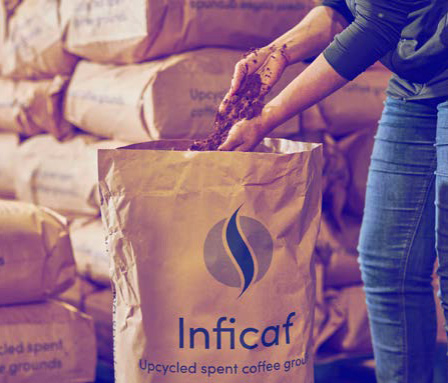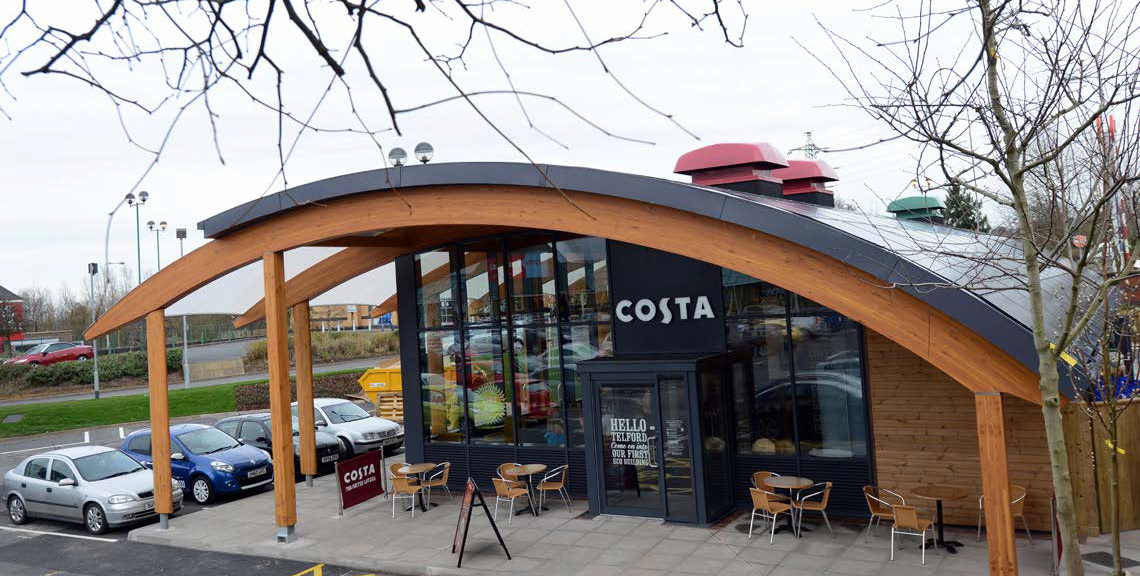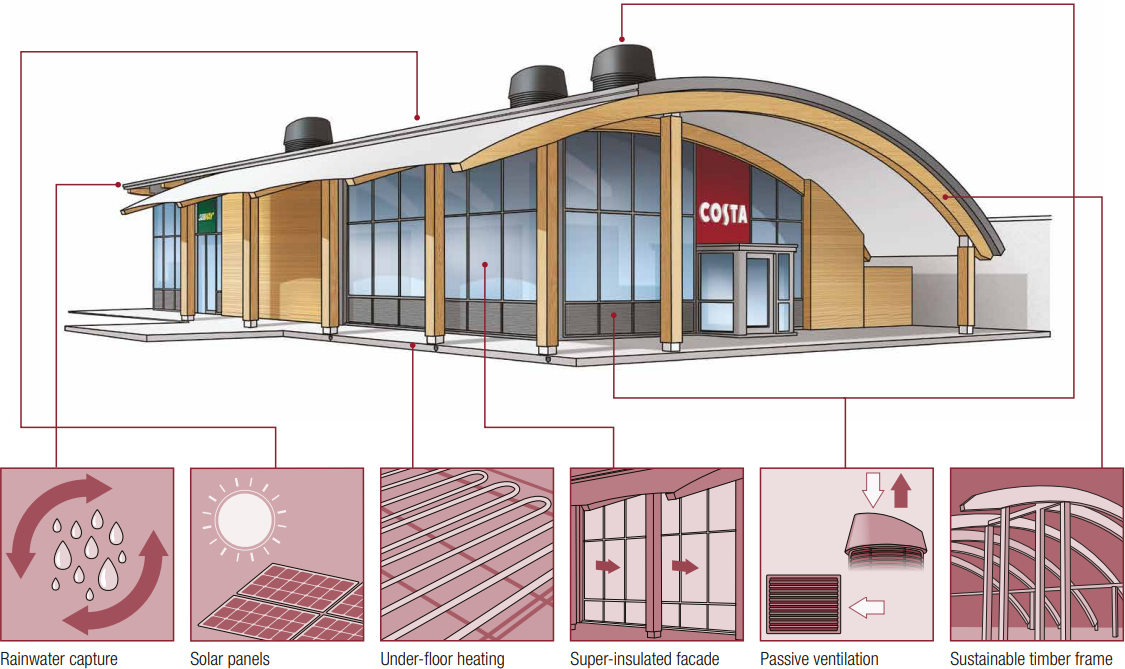Reducing impact takes innovation
HOW CAN A RETAILER REIMAGINE ENERGY AND WASTE ACROSS ITS PORTFOLIO?
ADAPT OR DIE
We all know that the retail industry has an uphill challenge to reduce its carbon footprint, but there is no alternative. There are two pivotal reasons why ESG is important to Costa Coffee’s brand: it is a high priority for both our investors and our customers. Failing to adapt could mean losing relevance and that can and has already been seen to have dire consequences for brands once deemed too big to fail. Change is something to embrace. After all, retail is innovative and imaginative and has always evolved with the times: the path to net zero will be no different.
There is no single way to reduce our climate impact; instead, it needs to be a core part of a business’s mindset, with ideas and initiatives coming from all aspects – from product sourcing to customer transaction. As a retailer in growth mode, we must think about bringing forward a better standard of buildings and the way we operate them. We don’t always have as much control of the built space on existing locations as we would like, but there are clear opportunities when developing new sites.
There are some great innovations coming to market that confront these challenges head on. Use your imagination and embrace the creativity of others and opportunities will present themselves in weird and wonderful ways. Here are some of the ways we are approaching issues around our building emissions, energy usage and waste.
BUILDING DESIGN
Costa Coffee has 4 EcoPods within the estate so far - these stores had sustainability built in from the initial concept through to the design and build stage. The units have a super insulated facade, passive ventilation, under floor heating, rainwater capture, and solar power generation. The primary structures are made from a sustainable timber frame construction and the roof design minimises solar gain, and therefore the need for additional cooling in the summer. These stores offer a long-term reduction in scarce freshwater usage, are c.30% more efficient and have a physical environment that both staff and customers enjoy.
As a tenant, we need developers to actively commit to sustainable design and engage specialist architects who have the skill and knowledge in this field. We have to work with developers and investors on our sites to ensure they buy into the long-term benefits of sustainable design verses the traditional methods. We are yet to quantify the premium for owning one of these investments in the long term, but instinctively it is the only direction worth taking.
What to do to improve our existing store portfolio has become an ever more pressing issue, given the government’s proposed agenda to bring stock up to minimum standards of efficiency by 2030. Who pays for this will be hotly contested between landlord and tenant if their respective interests differ in the short and long-term.
ELECTRIC VEHICLE (EV) CHARGING
There is a strong and natural synergy for Costa Coffee and the rapidly evolving EV charging market. The government has targeted 300,000 non-domestic charge points by the end of the decade, equivalent to a tenfold increase. Chargers will need to be conveniently located on the transport network and in retail and workplace settings. With much of our estate already roadside or on retail parks, we are well placed to adapt to the rising demand for rapid charge space for the EV driver, with a convenient dwell time offer. This builds in resilience to our offer as well as serving an important public resource on the road to a lower carbon future.
EV charging providers have been entering the market for some time now, including traditional fossil fuel distributors (Shell Recharge and BP Pulse) who can make the most of adapting existing petrol stations. There are also a host of new ventures creating new formats or retrofitting charging units into other types of location and we are already partnering with several specialists.

Source: bio-bean
Gridserve are rolling out a national network of electrical vehicle forecourts, which will effectively become the ‘gas station’ of the future. Their first site is in Braintree, Essex, and includes a collaboration with Costa Coffee, M&S Simply Food and WHSmith’s. This allows both the car and driver to refuel with a coffee, read a paper, use the co-working facilities, or even work out on an exercise bike1. For Costa’s existing store estate, we are working with Instavolt with the rollout of EV charge points across our drive-thru network (coffee, charge, drive).
While there is considerable demand for charging sites, there are challenges with the rollout of a national EV charging network at the strategic level due to a shortage of capacity on existing power networks. As we transition to more electric vehicles, who will pick up the cost of investing in these networks? We have sites where EV installation is unviable, not through lack of appetite, but due to the significant investment costs to upgrade capacity and local network connectivity. The private sector will deliver, but only through more public sector support.
ENERGY
Similarly with energy, the crisis we face isn’t just one of cost and affordability, but more about availability. With ever-increasing wholesale energy market prices, what alternatives do retailers have for securing cheaper, greener fuel? Our aspirations for decarbonising energy usage are supported where PV (solar panels) can be installed, but often hindered in locations where, through no lack of will, we continue to rely on the UK energy market. With multiple businesses pledging to hit their net zero ambitions postCOP26, the price of Renewable Energy Guarantees of Origin (REGO) certifications has jumped 12-fold in recent months. The demand for REGO backed renewable energy has significantly outweighed the availability of production and the lack of infrastructure is creating a major bottleneck in delivery.
The Government urgently needs to review its energy strategy here. One option could be to encourage more Power Purchase Agreements (PPAs), which require long term investment into new green energy projects with a guaranteed forward purchase fixed price. Would tax incentives lead to greater investment into PPAs, resulting in greater investment in green energy productions and create certainty for business?

Source: bio-bean
WASTE
Waste is a clear challenge for the retail sector and we are making inroads at reducing our impact via some truly inspirational innovations. There are three principal waste streams from our store network; coffee, cups, and a small amount of food. It just goes to show that one man’s trash is another man’s treasure.
For coffee waste, Costa has partnered with bio-bean for over 6 years and recycled more than 21,000 tonnes of spent coffee, resulting in reduced GHG emissions and diversion away from landfill or incineration to a sustainable reuse material. bio-bean has discovered ingenious ways of upcycling spent grounds, including extraction of residual key compounds for a food and beverage flavouring ingredient, and the manufacturing of solid biofuels in the form of Coffee Logs and coffee pellets2. Coffee Logs generate 132% fewer emissions than if the coffee grounds went to landfill, and they burn 20% hotter than kiln-dried wood. bio-bean have also transformed Costa’s spent coffee grounds into Inficaf – a sustainable raw material for use in plastics and bioplastics, automotive friction, cosmetics and more – which we’re exploring use of in our store infrastructure.
Single use cups gain the most headlines in the press when linked to campaigns against their use. At the end of 2021 we changed the lining of the inside of our takeaway cups to a plant-based plastics rather than oil-based plastic. These new cups have a 26% lower carbon footprint than a standard takeaway cup when recycled. Costa is also a founding member of the National Cup Recycling Scheme3 which operates a take-back scheme for used single use cups, which are sent for specialist reprocessing and reuse. We are committed to recycling cups, even if those brought back don’t originate from us. We also support schemes run via local authorities who provide on-street recycling points for such material, although contamination remains an issue.
Given the high volume of single use cups that the entire industry uses daily, a shift in consumer behaviour is required from ‘single use’ to a ‘reuse’ mindset. The government has already indicated that they are considering mandatory takeback schemes for single use cups with ongoing speculation of a cup levy being introduced. If we cannot nudge the consumer to reuse, then doing more to capture at the point of disposal has to be a step forward.
For our food waste, we first partnered with Too Good To Go in 2018 to ensure that unsold edible food wasn’t unnecessarily going in the bin. The scheme was extended to over 1,100 stores in early 2021. Any left-over food waste is turned into biogas via AD partners.
CLIMATE ACTION
We’re not there yet, but the opportunities to improve our climate impact are evolving all of the time. Consumers demand it and so should we. It isn’t always easy, either because a solution is cost prohibitive, or the infrastructure available to us is lacking.
Are we doing enough? It would be hard for anyone to honestly claim that they were. However, are we committed to change, and do we recognise the urgency? Absolutely. That’s why Costa is one of the development funders of the British Retail Consortium’s Climate Action Roadmap and we are committed to our part in delivering on the industry’s net zero ambition.
The journey of adaptation is a genuinely exciting one to be part of. I am positive about the outlook, our role in doing the right thing and discovering new innovations and enterprises that will help lead us there.





